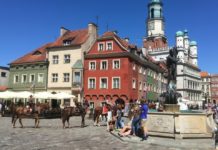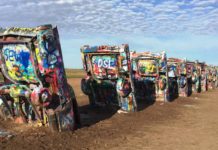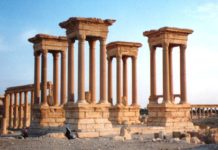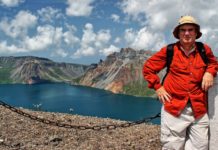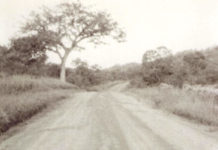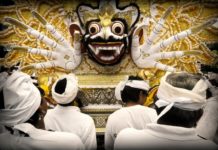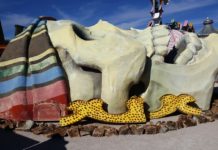CONCLUSION
I am a patriot, and I love my country. Because my country is all I know – “I Am A Patriot” by Steven Van Zandt (1984)
After relaxing in Dublin and regaining our strength, Ted and I boarded a flight from Ireland to the United States. On November 4, 1972, we landed in Boston where we were greeted by brutally cold weather and a driving snow storm.
We figured that we had one more adventure left in us, so we hoped to hitchhike across the country to California. Our loosely formed plan would first take us to London, Ontario, to visit Debbie Brennan, the girl I’d met along with her brother while traveling in Morocco. When I last saw her, she had told me to stop by if I was ever in the neighborhood.
I honestly thought there wasn’t anything that could be worse than trying to hitchhike in the sweltering heat of Zambia. Boy, was I wrong. Nothing could have prepared me for what it was like to try to thumb a ride out of the Boston airport in the dead of winter. Nobody wanted to pick us up, and we had a lot of competition. I was surprised at how many other young people were also on the highway looking for rides.
By the time we made it to Buffalo, we were in the middle of a full-blown blizzard. Seeking shelter in the main bus terminal downtown, we found a corner to spend the night, but a group of aggressive homeless men made it clear that we were encroaching on their territory. It was one of the worst nights either of us had ever experienced.
At four in the morning while I was sound asleep on a bench, a mean, dirty, hairy drunk woke me up. He made it clear that if I didn’t give him any money, he was going to beat the shit out of me. The dude had to be at least sixty years old, but he was big, angry, and meant business. Ultimately, I convinced him that we were equally broke.
Somehow, we managed to make it through the night without getting pummeled, but it was impossible to get any sleep. Ted and I trudged out of the terminal shortly after dawn and headed back to the highway.
“He wound up being another person we’d encounter on the road who we were destined to meet.”
I never knew how legendary Buffalo was for its winters. With at least a foot of snow on the ground, any drivers who were crazy enough to be on the road had no interest whatsoever in picking up a couple of wild and crazy looking hippies like us.
Once we got to the entrance of the interstate, the police approached us and informed us that we couldn’t hitchhike from that spot. After moving a half mile away from the on-ramp, we realized there was no way we were going to get a ride so far from the highway.
Ted and I ducked into a cafe and warmed up over soup and coffee. After an hour, we went back to the same place where the cops chased us off to see if we could get a ride before they busted us again.
Immediately, we got a lift from a young black guy in a Buick Riviera who looked like he could have stepped off the set of Soul Train. Reuben had a medium-length, perfectly trimmed afro and was dressed in nice slacks and a blazer. His neatly pressed white shirt was open at the collar. He wound up being another person we’d encounter on the road who we were destined to meet, and as it turned out, he needed to meet us, too.
As we headed out of Buffalo, the heater was cranked up high, and the radio was blasting Motown music. Unfortunately, minutes after he picked us up, Reuben’s car broke down. In sub-zero weather and snow still falling, Ted and I got out and pushed his car to the next exit, off the highway, and into a gas station.
The problem turned out to be his water pump. By the time it was replaced by the mechanic, it was late in the day. Reuben was so grateful for our help that he offered us a place to stay the night. He attended college and lived with a bunch of other students in a big house right outside Buffalo. It was turning dark as we pulled into his driveway, and a new round of snow began to fall.
His roommates were one of the most eclectic groups we had met, which was saying a lot, considering the characters we’d run into over the last year. We were never officially introduced to all of the house’s inhabitants, but they came and went during our brief stay.
Inside the kitchen, one woman, Ramona, had a big pot of spaghetti and sauce cooking on the stove. She served us a delicious dinner. Reuben also had some excellent marijuana, and after our meal we all sat around getting stoned as Ted and I blew their minds with our stories from Africa.
While we were in the living room getting baked, a man and a woman came in from outside. Shivering and blowing on their hands, they brushed off the wet snow and plopped down on the couch. Suddenly, the woman and Ted locked eyes and stared at each other.
Ted finally said, “Wait a minute. I know you! You’re Pat? From Germany? Holy fuck!”
“Ted?” Pat asked incredulously. “Oh, my God. What are you doing here?”
It was one of the strangest coincidences I’d witnessed in my entire life. I thought I had certainly, finally, smoked too much pot.
They hugged each other tightly and laughed.
“I can’t believe it!” Ted exclaimed.
I soon learned that he had met Pat while traveling in Europe with David O’Connor three years earlier.
“What the hell are you doing here?” Pat asked again.
Ted went into a long explanation about how he and I had been traveling in Africa and were hitchhiking home when Reuben picked us up.
“Do you remember, David?” Ted asked.
“David O’Connor gave me this sweater!” she squealed as she pointed to her white, Irish wool, cable-knit sweater.
With our minds totally blown, Reuben rolled up another fat joint and we passed it around. Pretty soon we were all blasted, laughing hysterically about the unbelievable odds of such a chance meeting.
During the course of the bizarre evening, Pat came up with an idea for us that made a lot of sense. Recently, a friend of hers had found a Ford dealer in Detroit who needed to get a new car to another dealer in Arizona. Her friend picked up the car, paid for the gas, drove it to Phoenix, and delivered the car. The dealer paid her a hundred dollars. Pat suggested that we search the classified ads for a similar deal.
“I was even more nervous about crossing the border than the time I went hunting with my dad.”
The following day, in a more sober state, we combed the automotive section of the newspaper’s classified ads and found our deal. A Chevrolet dealer in Detroit was paying qualified drivers to take new cars to Los Angeles. Hey, who could be more qualified than us? We both had valid driver’s licenses!
How did things like this keep happening to us? We seemed to have an endless supply of completely undeserved good fortune. I’m not a man of faith, but I swear somebody somewhere was looking out for me.
In another inexplicable turn of events, the road from Buffalo to Detroit ran directly through London, Ontario, Canada. Reuben offered to drive us across the Canadian border to attract less attention than if we hitchhiked or walked across. He said that he’d take us to Niagara Falls, leave us on the Queen Elizabeth Highway, and from there we could catch a ride to London.
In Reuben’s Buick Riviera, we crossed into Canada. To the officials, we were simply a few odd looking American tourists who came to see Niagara Falls in the dead of winter. I was even more nervous about crossing the border than the time I went hunting with my dad, since I was in such a precarious legal situation. I was relieved when we got through without an ounce of trouble and were on our way.
After buying Reuben a hearty breakfast in Niagara Falls, we said goodbye to him with a true sense of gratitude. He’d given us the next piece to the weird puzzle we’d been working on.
We easily got a ride to Hamilton where we stopped for lunch. Another car brought us to London by mid-afternoon. Debbie had no idea we were coming. I hoped that we weren’t in for some painfully embarrassing situation.
Returning from work, Debbie pulled into her driveway and found us seated on her doorstep. Completely stunned but still very gracious, she welcomed us into her spacious two-bedroom apartment. I introduced her to Ted and explained the circumstances that had led us to her door.
At first, the conversation was a bit awkward, but it quickly passed. Soon we were all sitting in her kitchen, drinking tea, and eating sandwiches. Despite catching her by total surprise, Debbie was the perfect hostess.
As the evening went on, I started having violent stomach cramps and diarrhea. I really needed Ted to step up and persuade her to let us stay overnight. Ted and I both had the ability to turn on the charm when needed. Sometimes he would be the man for the job; other times, it was me who took on that role. This act had gotten us through many dicey situations.
Debbie turned out to be as cool and friendly as I’d remembered her to be. She told us that we could use the fold out couch in the living room. Ted and I took hot showers and shaved. We wanted to look our best when we showed up for our vehicle in Detroit.
Debbie told us how she and Philip had traveled all around Algeria and Tunisia. They sold the car in Tunis and took a boat to Italy where they traveled for three more weeks before returning home. I was hoping to see Philip, but he had gone out of town, and we missed him by one day.
I sensed that Debbie was wondering if I was expecting something more from her. Maybe she thought that I was trying to hit on her or rekindle the spark we had back in Morocco. I made it clear to her that was not the case. Since I made frequent trips to the bathroom throughout the evening, she could see for herself how fucked up I was. It was obvious that I was in no shape for anything beyond collapsing for the night.
Debbie advised us to take a bus from London to Detroit. That would make for an easier border crossing back into the United States, not to mention being more tolerable in the freezing weather. She was another vital person who was there for us at the right time. We needed her to show us the next move, and she did. I realized that I was very fortunate to have met her under two unique sets of circumstances.
There was something magical about meeting people like Debbie, Reuben, Wilson, and the missionaries in Zambia. Ted and I seemed to find them when we were most in need. It made me think about things being providential. Maybe it was a matter of pursuing life in a way that forces something to happen, like sticking your thumb out and asking for a ride. If you put yourself out there on the road like we did, you are bound to set events in motion. I guess whether it’s good or not depends on your luck, and I had a lot of it.
The next day, we arrived in Detroit, picked up a brand new Chevy Caprice, got on the road, and headed west. Our plan was to drive to Chicago, where we’d catch Route 66 all the way to Los Angeles. We stopped for every hitchhiker we saw along the way.
It felt surreal to be back in the United States for good, or at least for the foreseeable future. I had spent so much time and energy staying away, but now I was elated to be here. How could I ever explain that to anybody? How would I be able to convey what I’d seen and what I’d been through?
“When Ted asked what I was going to do, I told him that I had no absolutely no idea.”
Ted and I talked about how we wanted to set off again one of these days. Maybe we’d head to South America. The travel bug was firmly ingrained in us. After what we had experienced, it was difficult to imagine settling down, unless it was in a hut on a beach somewhere, but for now it wasn’t realistic.
While we were driving across the country, Ted told me that he might go back to school or get a job and save enough money to take off again. When he asked what I was going to do, I told him that I had no absolutely no idea.
We arrived in Los Angeles on a beautiful sunny day, with no clouds in the sky and a temperature of 75 degrees. In a little over four days, we had driven from Detroit all the way to the Pacific Ocean. It felt great to be home again. Without looking at a map or asking for directions, we drove directly to the dealership in Santa Monica, dropped off the car, and collected a hundred dollars. Afterwards, we headed to a coffee shop near the beach to have lunch and call home.
I hadn’t communicated with my parents since I’d left Dublin. They were probably wondering where the hell I was. I didn’t want to show up unannounced, so I told them I’d see them by the end of the day. When I got to the driveway, I walked up to the front door and rang the bell to my own house. My mom answered, and we hugged for a long time. Then my dad and I hugged each other, and we all had a good cry.
My father showed me the freezer in the garage that was full of moose meat. Hamburgers, roasts, and steaks were perfectly preserved and waiting for me to sample. That night my mom cooked a huge dinner.
I spent the next week telling my parents what the last year had been like. Explaining some of the things that Ted and I had been through wasn’t easy, and I wondered if they thought I was making up parts of the story. I called my old friends, and it was insane trying to catch up with them and tell them what I had been doing all this time.
At the same time, I assembled my conscientious objector proposal. My grandmother agreed to write a letter on my behalf explaining what a good Christian boy I was, and that I had always been opposed to war and killing my fellow human beings. One of my cousins also wrote a letter of support, saying that she’d known me to be a pacifist and disapproved of any kind of war or violence. It was lightweight stuff, but I knew that at this late stage it was my only chance.
Next I paid a visit to my alma mater, Blair High School in Pasadena. I was seeking anyone who might be an ally, and I was hoping to ask one of my favorite teachers, Richard Crowe, for a letter of support.
The students at Blair loved Mr. Crowe. I took his popular drama class in my sophomore year of high school. Thanks to him, I was introduced to powerful and dramatic theater, including works by Eugene O’Neill, William Inge and Arthur Miller.
Mr. Crowe was a big man, at least 6 feet tall with a full head of black wavy hair. His face was one of those that revealed every one of his emotions, with intense dark eyes that could stare a hole right through you. He had a booming voice and a reputation for bouncing chalkboard erasers off the forehead of any student who dared give less than total attention in class. He was the only teacher I’d ever heard swear.
When I walked into his classroom, he appeared surprised to see me but greeted me warmly. However, after I explained what I was looking for, he berated me in front of his entire class, called me a coward and a traitor, and threw me out of the classroom. I was shocked and humiliated. Needless to say, I left empty handed.
I completed the conscientious objector application as thoroughly as I could, but, I have to admit, it was a shoddy package. I didn’t expect it to be met with any more consideration than the last one. Hopefully, it would buy me time.
Thankfully, my doctor discovered the source of my intestinal illness and treated me for a parasitic infection similar to cryptosporidium. He was certain that I’d gotten it from drinking contaminated water. After months of not feeling well and losing a lot of weight, it felt good to be on the mend.
From that point on, I spent my days wondering how to proceed with my life. I desperately needed a plan. My fate was firmly in the hands of the government, and my case was sure to be denied. I had no money, no job, and couldn’t even afford to escape to Canada if I wanted to. Perhaps I should have stayed there instead of coming home to a fate that now seemed relatively certain.
I had been anxiously checking the mail each day for any word from the Selective Service System. Then, in January 1973, without warning, while my case was under appeal, the government announced an end to the draft. It was to be replaced with a program of voluntary enlistment.
A lot of people felt very vindicated when they heard this. So many had fought to make it happen, and I thought about them as I digested the news. I wondered how this would affect my case, or if it even would. Any way you looked at it, it was still wonderful news.
Two months later, I received a letter from the Selective Service informing me of my new classification: non-eligible status. They had completely dropped my case. Just like that, it was over. I had successfully stalled off the Selective Service System and avoided the draft without ever having broken the law. I was stunned and elated that after all this time my struggle could be over so abruptly.
What I had to do now was put my life back together and pick up where I left off. I needed to get back to school, get a job, and find a place to live. College and planning a career had been put on hold while I fought the draft. I felt that I had to make up for lost time after spending some important coming-of-age years on the road and on the run.
There was no way I’d ever know what might have happened if my life hadn’t taken this turn, but of course that was the choice I had made. I could have spent this time in a completely different jungle.
I also realized how fortunate I was that the course of events had turned out so well for me. Tragically, it had not turned out so well for thousands of others. I was glad that my fight with the Selective Service was over, and I wasn’t in any permanent trouble.
“Over the years, my avoidance of military service and specifically the draft has been a sensitive subject for me.”
I knew there would be a definite period of adjustment. Besides getting used to a life where I didn’t have to get up the next day and hitchhike to another place, I had a real sense of relief that I would no longer have the draft hanging over my head. Nevertheless, I was angry when I thought about how the government had fucked with my life like this. They had barged in and threw things off course for me at a very pivotal time.
I reflected on what I had been through and what so many others, who had faced a similar choice, had been through. I thought a lot about what our country had been through. Because of the Vietnam War, many of us would never be the same, for many different reasons.
Obviously, I was one of the lucky ones. I escaped the war without any physical injuries, and without breaking the law. I’d had a life changing adventure, even if I had ironically put myself in very dangerous situations in the process. I also came home with a new found love and respect for my country, after having seen so many others. It was obvious to me that America was better than any country I visited by a long shot.
I wasn’t like a lot of draft dodgers. Not only did I not burn my draft card or the flag, I left the country in 1971 after thousands of others had already done so. By the time I went away, it was obvious to any thinking person that the war was a lost cause. It was after the Chicago Seven Trial, after four protesters were killed on the campus of Kent State, after the publication of the Pentagon Papers, and after American heroes like John Kerry spoke these words before Congress:
“In our opinion, and from our experience, there is nothing in South Vietnam, nothing which could happen that realistically threatens the United States of America. And to attempt to justify the loss of one American life in Vietnam, Cambodia, or Laos by linking such loss to the preservation of freedom, which those misfits supposedly abuse, is to us the height of criminal hypocrisy, and it is that kind of hypocrisy which we feel has torn this country apart.” – John Kerry (1971)
I was interviewed once for a book called Hell No, We Won’t Go! by Sherry Gershon Gottlieb (Viking 1991). At the time, I was reluctant to use my own name, so the author gave me the name Crawford Dunnett. The book is a fascinating collection of stories of people who avoided going to Vietnam. Some of them were conscientious objectors, some of them went to jail, feigned insanity, or went to Canada.
I have never met anyone who traveled as far as I did to avoid being drafted. I did not meet any other draft dodgers while I was abroad. Over the years, my avoidance of military service and specifically the draft has been a sensitive subject for me, especially in certain company. While I’ve thought of it as something that I was not ashamed of, I’ve always been careful not to brag about it.
“Many people would rather see my name etched into the Vietnam Memorial than printed on the cover of this book.”
Was the draft a test of our patriotism? Were those who chose to be drafted more patriotic than I? Would I have been a patriot if I had blindly obeyed an order that I abhorred? Were those who served in the military braver than I, or was I the brave one for questioning the authority of my government? Was I a traitor to my country for avoiding the draft? These are concepts that I have struggled with for almost a half century. They are also questions I am thankful to be alive to ponder. I am not the only one who has pondered these issues, and wrestled with such conundrums. With no easy answers to any of these questions, the debate rages on.
Draft dodgers were hated by much of the population, and that sentiment continues to this day. Many people would rather see my name etched into the Vietnam Memorial than printed on the cover of this book. However, there remain misconceptions about us. There are those who think that draft dodgers are traitors who hated both America and veterans of Vietnam and other wars. They assume that we felt superior or maybe more principled because we refused to go to war. For me, nothing could be further from the truth.
To begin with, I loved America then, and I love it now. I hold all veterans in the highest regard. Many of them were just like me – young men faced with a major life changing decision at a time when we may have been ill prepared to fully comprehend the ramifications of our choices. I consider them all to be heroes, the best and the brightest our country had to offer.
I once read a quote attributed to Richard Nixon, of all people, that I think sums up the variety of sentiments quite well:
“No event in American history is more misunderstood than the Vietnam War. It was misreported then, and it is misremembered now. Rarely have so many people been so wrong about so much. Never have the consequences of their misunderstanding been so tragic.” – Richard Nixon (1985)
My generation was known for some very self-destructive behavior, and I am no exception. It was a lifestyle that cost many of us dearly. Almost everyone my age knows at least one person who either didn’t survive such extreme behavior, or who didn’t survive wholly. I am thankful for having lived long enough to attain a certain level of maturity and common sense. Indeed, I have learned some lessons the hard way.
As I said at the beginning of this book, I’ve met men who, after all these years, deeply regret not having served in Vietnam. I’ve also met men who are sorry they did serve, and wish they had refused to. I have friends who served proudly in Vietnam, yet completely sympathize with those of us who didn’t. I’ve also met some who have no sympathy for draft dodgers at all, and who still see us as cowards and traitors. Sadly, a few men I’ve known who served in Vietnam came home as human tragedies, suffering from horrible physical and psychic wounds.
I have received a number of hateful Facebook comments and emails for writing this book, which has not been a surprise. However, it serves as a stark reminder of how fresh and raw these feelings are even today. Many people continue to scorn those of us who avoided military service. To those who hate me for the decision I made when I was 19 years old, all I can say is that I hope someday you can throw your hatred down.
In the final analysis, I’ve never had any serious regrets about what I did. I survived with many memories, good pictures, and a lot of interesting stories to tell my grandchildren. I developed a passion for traveling; it has helped define who I am. My experience taught me to trust my instincts and not to fear the unknown. I will always love the feeling of being on the road and never knowing what might be around the next curve. One thing is for sure: I’ll ride the wave where it takes me.
THE END


